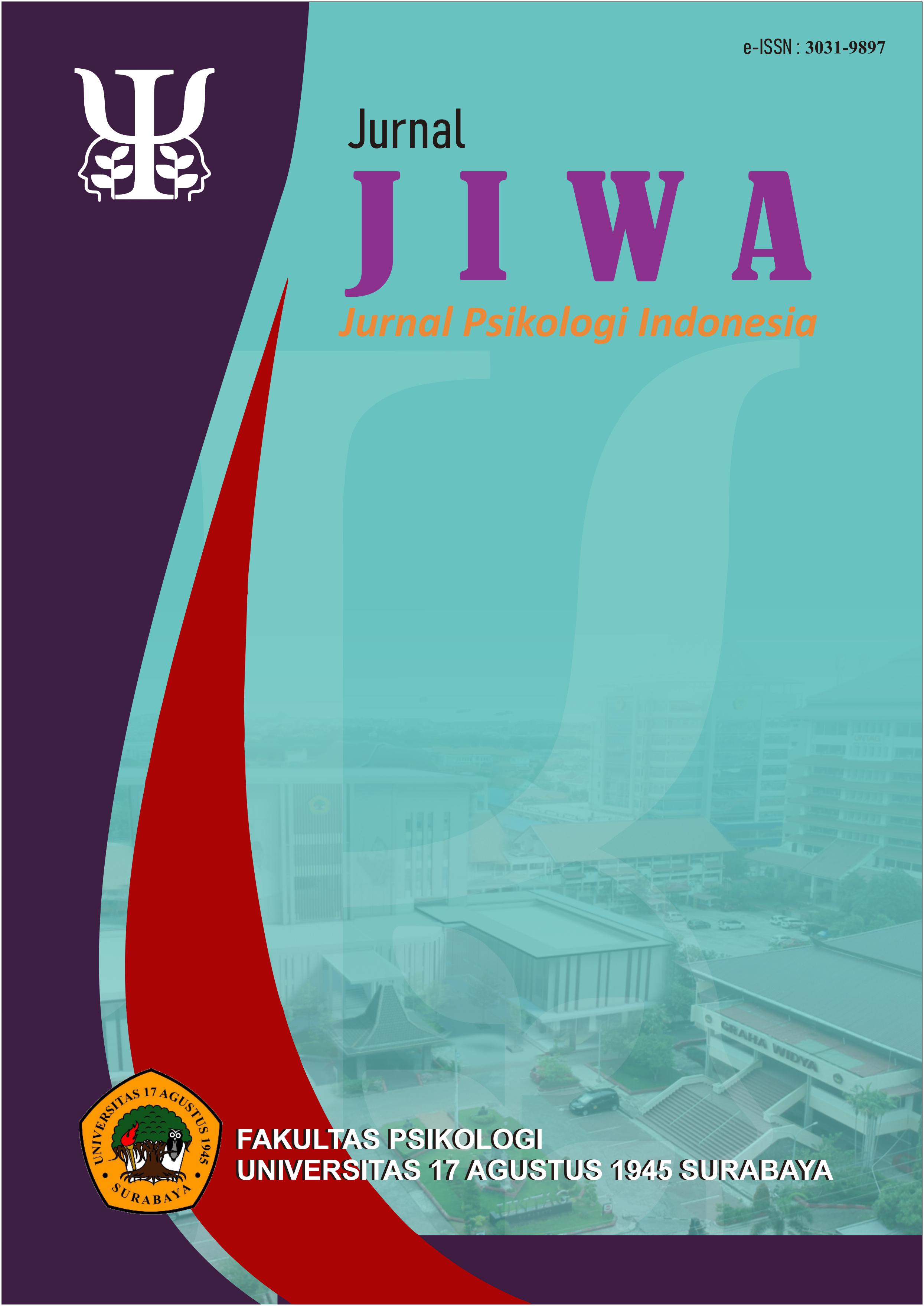Problem solving ability pada siswa : bagaimana peran self efficacy
DOI:
https://doi.org/10.30996/jiwa.v2i2.11621Keywords:
problem solving ability, self efficacy, siswaAbstract
The objective of this research is to determine the relationship between self efficacy and problem-solving ability among students at SMK PGRI 2 Ponorogo. This study employs a quantitative research method. The population in this study consists of all 11th-grade students at SMK PGRI 2 Ponorogo, totaling 899 students. The participants in this research amount to 315 students, selected using the accidental sampling technique. The data collection instruments in this research include two scales: the problem-solving ability scale and the self efficacy scale. The data analysis technique used is product moment correlation. Based on the results of the data analysis, it is demonstrated that self efficacy has a positive and highly significant correlation with students' problem-solving ability. In conclusion, the hypothesis in this study is accepted.
Tujuan dari penelitian ini adalah untuk mengetahui hubungan antara self efficacy dengan problem solving ability pada siswa di SMK PGRI 2 Ponorogo. Penelitian ini menggunakan metode penelitian kuantitatif. Populasi dalam penelitian ini adalah seluruh siswa kelas XI SMK SMK PGRI 2 Ponorogo dengan jumlah 899 siswa. Partisipan dalam penelitian ini berjumlah 315 siswa yang diambil dengan menggunakan teknik accidental sampling. Instrumen pengumpulan data dalam penelitian ini menggunakan dua skala, yaitu skala problem solving ability dan skala self efficacy. Teknik analisis data yang digunakan adalah korelasi product moment. Berdasarkan hasil analisis data dibuktikan bahwa self efficacy berkorelasi positif dan sangat signifikan dengan problem solving ability siswa. Kesimpulannya, hipotesis dalam penelitian ini diterima.
Downloads
References
Arifiana, I. Y., Hanurawan, F., Rahmawati, H., & Eva, N. (2021). Kemampuan Problem Solving Mahasiswa Rendah: Bagaimana Cara Meningkatkannya? In Seminar Nasional Psikologi dan Ilmu Humaniora (SENAPIH) (Vol. 1, No. 1, pp. 149-157).
Artha, N. M. W. I., & Supriyadi, S. (2013). Hubungan Antara Kecerdasan Emosi dan Self Efficacy dalam Pemecahan Masalah Penyesuaian Diri Remaja Awal. Jurnal Psikologi Udayana, 1(1). https://doi.org/10.24843/JPU.2013.v01.i01.p19
Cetin, S. Y., Erel, S., & Ozalp, O. (2018). Assessment of problem solving proficiencies with self efficacy perceptions of students in faculty of health sciences of cyprus international university. SHS Web of Conferences, 48, 01025. https://doi.org/10.1051/shsconf/20184801025
Hardianto, G., Erlamsyah, E., & Nurfahanah, N. (2016). Hubungan antara Self efficacy Akademik dengan Hasil Belajar Siswa. Konselor, 3(1), 22. https://doi.org/10.24036/02014312978-0-00
Jatisunda, M. G. (2017). Hubungan Self efficacy Siswa SMP dengan Kemampuan Pemecahan Masalah Matematis. 1(2). Jurnal THEOREMS (The Original Research of Mathematics), 1(2)
McLaughlin, K., Moutray, M., & Muldoon, O. T. (2008). The role of personality and self efficacy in the selection and retention of successful nursing students: A longitudinal study. Journal of Advanced Nursing, 61(2), 211–221. https://doi.org/10.1111/j.1365-2648.2007.04492.x
Metz, K., Lewis, J., Mitchell, J., Chakraborty, S., McLeod, B. D., Bjørndal, L., Mildon, R., & Shlonsky, A. (2023). Problem-solving interventions and depression among adolescents and young adults: A systematic review of the effectiveness of problem-solving interventions in preventing or treating depression. PLOS ONE, 18(8), e0285949. https://doi.org/10.1371/journal.pone.0285949
Nahdi, D. S. (2017). Implementasi Model Pembelajaran Collaborative Problem Solving Untuk Meningkatkan Kemampuan Representasi Matematis Siswa Sekolah Dasar. Jurnal Cakrawala Pendas, 3(1). https://doi.org/10.31949/jcp.v3i1.328
Noer, S. H. (2012). Self efficacy mahasiswa terhadap matematika. In Makalah pada Seminar Nasional Matematika dan Pendidikan Matematika (Vol. 10, pp. 801-808).
Ocak, G., Doğruel, A. B., & Tepe, M. E. (2022). An Analysis of the Relationship between Problem Solving Skills and Scientific Attitudes of Secondary School Students. International Journal of Contemporary Educational Research, 8(1), 72–83. https://doi.org/10.33200/ijcer.780710
Priska, J., & Rahmawati, E. (2020). Pengaruh Self Efficacy, Motivasi Dan Kepuasan Kerja Terhadap Kinerja Karyawan PT. PLN Puruk Cahu Kabupaten Murung Raya. Jurnal Bisnis Dan Pembangunan, 9(1), 83-98.
Putra, G. N. S., Meiyuntariningsih, T., & Ramadhani, H. S. (2023). Problem solving ability pada mahasiswa: Menguji peran Self efficacy. 2(4).
Septhiani, S. (2022). Analisis Hubungan Self efficacy Terhadap Kemampuan Pemecahan Masalah Matematika. Jurnal Cendekia: Jurnal Pendidikan Matematika, 6(3), 3078-3086.
Tasgin, A., & Dilek, C. (2023). The mediating role of critical thinking dispositions between secondary school student’s self efficacy and problem-solving skills. Thinking Skills and Creativity, 50, 101400. https://doi.org/10.1016/j.tsc.2023.101400
Tösten, R., Han, B., & Anik, S. (2017). The Impact of Parental Attitudes on Problem Solving Skills in High School Students. Universal Journal of Educational Research, 5(1), 170–174. https://doi.org/10.13189/ujer.2017.050121
Valdez, J., & Bungihan, M. (2019). Problem-based learning approach enhances the problem solving skills in Chemistry of high school students. Journal of Technology and Science Education, 9(3), 282. https://doi.org/10.3926/jotse.631







